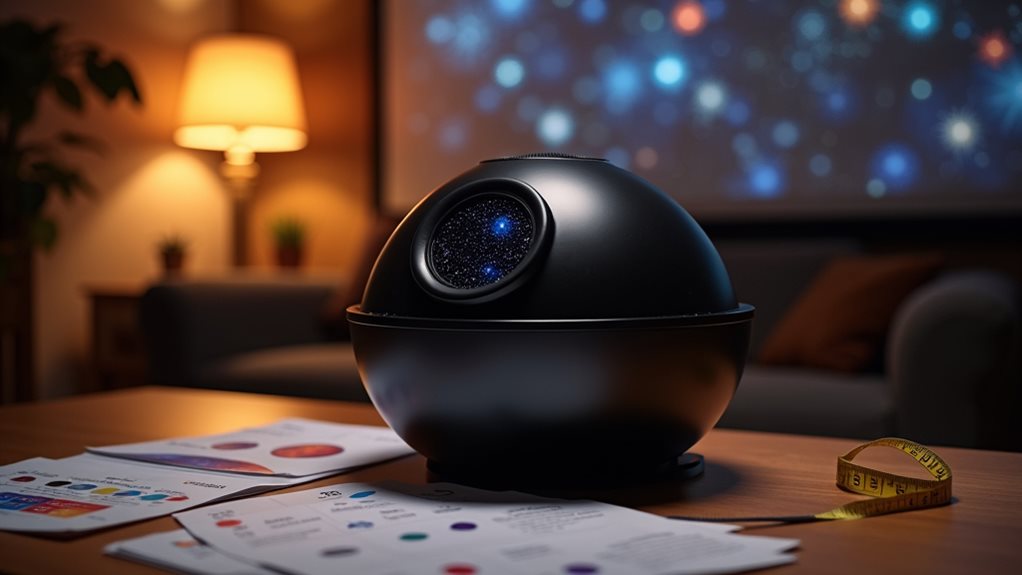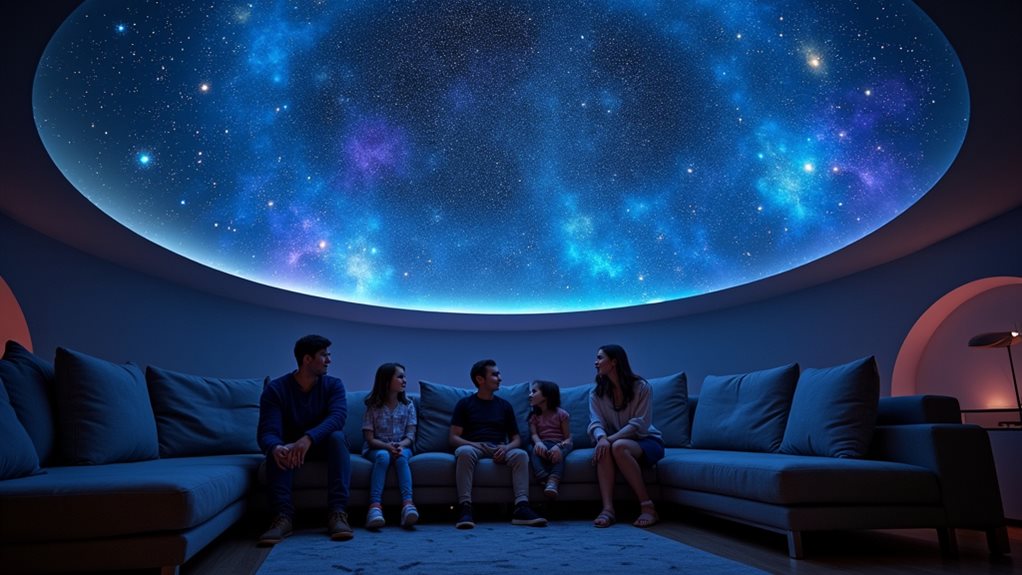Astronomy is an exciting subject that can open children’s minds to the wonders of the universe. Introducing kids to astronomy at an early age has many benefits and can be a great way to foster their interest in science.
It occurs to me that introducing kids to this fascinating field will help them develop essential life skills such as critical thinking, problem-solving, and collaboration. It will also give them a better understanding of our place in the universe and how we interact with it.
By learning about astronomy, children can gain valuable knowledge about the world around them and also how they fit into it. This will not only help them become more informed citizens but also give them a unique perspective on life that they can apply in other areas of their lives.
Furthermore, astronomy activities are fun and engaging for kids; this allows them to have fun while learning important concepts. With all these advantages, introducing young children to astronomy is undoubtedly a great decision for parents and educators alike.
Why Introduce Astronomy?
Introducing astronomy to kids at an early age is like opening a door to a world of endless possibilities. Astronomy provides children with the opportunity to explore galaxies and understand constellations, while learning the terminology of planets and recognizing stars in the night sky. It helps young minds develop positive cognitive effects from discovering the wonders of space and examining its contents.
By introducing astronomy to kids at an early age, we’re allowing them to go beyond the boundaries of this planet, and gain a new perspective on our universe that stimulates their imagination. Through astronomy, children can learn about our place in space, embrace nature’s beauty, and even make connections between science’s most astounding mysteries.
Ultimately, giving children access to astronomical knowledge can provide them with a unique appreciation for science and its impact on our daily lives.
The introduction of astronomy can also be used as a platform for developing critical thinking skills. By exploring concepts such as gravity, speed of light, or distant galaxies, kids can practice analytical skills while having fun at the same time. Astronomy encourages curiosity within students and helps them build problem-solving abilities by providing creative solutions to questions related to space exploration.
In addition, studying the stars will expand their understanding of mathematics and physics in ways that are both challenging and rewarding.
Positive Cognitive Effects
Introducing astronomy to kids at an early age can have some really positive cognitive effects. It can help develop problem-solving skills, increase creativity, and increase attention spans. As an astronomy education expert, I’ve seen firsthand how inspiring this topic can be for young learners.
Improved Problem-Solving Skills
Introducing astronomy to kids at an early age permits them to explore the world around them and develop essential problem-solving skills.
From exploring relationships among stars and planets, to recognizing patterns in the night sky, to analyzing data from space missions, astronomy provides a unique window into the universe that encourages children to think critically and creatively about the world around them.
By engaging with astronomy, kids are able to hone their problem-solving abilities, which can be applied in all areas of life.
Astronomy is thus a powerful tool for developing young minds and fostering lifelong learning.
With this in mind, it’s clear that the benefits of introducing astronomy to kids at an early age extend far beyond our own planet!
Increased Creativity
Introducing astronomy to kids at a young age can bring about an increased level of creativity.
As children explore the stars and planets around them, they are encouraged to think outside of the box and develop their imagination.
Through this exploration, they learn to appreciate art in new ways as they observe how the Universe works.
By cultivating curiosity and sparking creativity, astronomy can lead to an enhanced appreciation for art through a newfound appreciation of the beauty of space.
Astronomy thus helps to cultivate creative abilities that can be applied beyond just science and math, allowing kids to unlock their true potential!
Greater Attention Span
When it comes to cognitive effects, astronomy helps with more than just creativity, it also has a positive impact on children’s attention span.
With the ability to observe and study the wonders of the night sky, kids can improve their spatial awareness and critical thinking skills while engaging in scientific reasoning.
Astronomy encourages children to focus on a specific task for longer periods of time, helping them to better control their impulses and stay attentive when learning new concepts.
Through this activity, they are able to hone in on their observational skills while also developing an appreciation for detail and accuracy.
By improving their concentration and fostering greater attention span, astronomy can help young minds become more efficient at problem solving tasks in other areas of life.
Developing a Sense of Wonder
Introducing astronomy to kids at an early age can have a profound impact on their growth and development. Exploring space through stargazing events, planetarium visits, celestial photography and discovering planets can help cultivate a sense of wonder within these children. Allowing them to use their imagination and discover new things can foster creative thinking that will help them in many aspects of their lives.

It’s also important to note that introducing astronomy to kids at an early age helps develop problem-solving skills. By teaching them how to look up information, use scientific reasoning and apply mathematical concepts, they become more open-minded about other situations in life and how to handle them.
Transitioning into the next section about developing problem-solving skills is essential for a successful understanding of astronomy.
Developing Problem-Solving Skills
Introducing astronomy to kids at an early age can spark a sense of wonder and curiosity in the world around them. It also enables them to develop problem-solving skills that will help them think critically throughout their lives.
With astronomy, kids can learn about space exploration, star gazing, sky watching, and questioning assumptions. These activities can help them to better understand the world around them, while encouraging creativity and exploration.
Astronomy is a great way for kids to expand their horizons and explore the universe outside of their everyday life. Through hands-on activities like star parties and skywatching sessions, children can gain a deeper appreciation for the world beyond our own planet.
They are able to see how our planet fits into the larger picture of the universe, while discovering new facts and theories along the way. This type of exploration encourages kids to think outside of the box and come up with creative solutions to problems they encounter in their day-to-day lives.
By introducing astronomy at an early age, we are giving children a chance to develop skills that will benefit them throughout their lives. Not only does it promote critical thinking but it also helps children become more aware of their environment and encourages them to explore new possibilities.
Enhancing creativity is just one of many benefits that come from introducing astronomy to kids at an early age.
Enhancing Creativity
Introducing astronomy to children at an early age encourages them to explore possibilities, discover patterns, and understand nature.
By observing stars and appreciating the beauty of the night sky, kids gain a deeper appreciation for the wonders of the universe.
Furthermore, teaching astronomy to young minds helps them learn how to approach complex problems by breaking them down into manageable pieces.
Astronomy provides an excellent platform for kids to develop creative thinking skills.
They can take what they see in the night sky and make connections between different stars or celestial objects.
This creative process allows them to pose questions about the stars and planets that help them better understand our place in the universe.
It also encourages inquisitiveness, which is essential for furthering scientific knowledge.
Improving Interpersonal Skills
Introducing astronomy to kids at an early age can also promote social development.
Interactive activities and peer collaboration allow students to practice important interpersonal skills. Inquiry-based learning encourages critical thinking, while fostering positive relationships between students. Astronomy education gives students the opportunity to work together, developing communication and problem-solving skills in a fun environment.
These activities also provide an excellent platform for building self-esteem, as successful problem solving and group collaboration can boost confidence.
Astronomy education offers children countless opportunities to build relationships with peers and adults alike, while having fun in the process!
With these benefits in mind, next we will explore opportunities for hands-on learning that astronomy provides.
Opportunities For Hands-On Learning
Stargazing is a great way to get kids interested in astronomy from an early age. It’s a fun and easy way to learn about the night sky and appreciate its beauty.
With the use of a telescope, kids can get a much closer look at the planets, stars and galaxies, allowing them to gain a deeper understanding of our universe. Building spacecraft models is another engaging way for kids to learn about astronomy.
By constructing models of real-life space probes, kids can gain an appreciation for the engineering and technological feats humans have achieved in space exploration.
Stargazing
There’s nothing quite like stargazing on a clear night with your family!
From dark skies to light photography, introducing your kids to astronomy can provide them with the opportunity to learn in an interactive and experiential way.
Kids of all ages can find joy in connecting with the stars, taking pictures of constellations and galaxies, and exploring the wonders of our universe.
With dark skies becoming more rare due to light pollution, it’s important that our children take advantage of these opportunities while they’re available.
Let’s help them develop a lifelong appreciation of astronomy by creating memories that will last forever!
Telescope Use
Now that we’ve discussed the importance of stargazing, let’s explore how to make the experience even more memorable by introducing telescopes.
Telescopes allow us to get a closer look at galaxies, recognize constellations more easily, and use star charts for navigation.
With a telescope, kids can unlock the mysteries of our universe and gain an appreciation for astronomy that will last a lifetime.
So why not invest in a telescope today and give your kids the chance to explore galaxies up close?
Spacecraft Models
We’ve just discussed the importance of investing in a telescope to enhance stargazing opportunities and get kids exploring the mysteries of our universe.
Now, let’s talk about building confidence while exploring constellations through spacecraft models. This is a great option for those who are looking for hands-on learning experiences.
By constructing models of famous space crafts, kids can take part in virtual simulations that give them an up-close view of some of humanity’s greatest achievements in space exploration.
Not only does this help kids become more comfortable with the science behind astronomy, but it also allows them to explore constellations from a new perspective.
With their newfound knowledge and skills, they can confidently pursue stargazing with their very own telescope!
Building A Foundation For Future Studies
Giving children access to the wonders of astronomy at an early age has tremendous potential for inspiring a love of science and exploration.
Introducing concepts such as exploring the night sky, identifying stars, understanding gravity and discovering planets in a fun and engaging way can help kids develop a strong foundation in the field that they can build upon as they get older.
Examining comets is another excellent activity for introducing young minds to astronomy. By teaching kids about the orbits of comets and their connection to other celestial objects, it’s possible to foster a foundational appreciation for the relationship between science and nature.
Hands-on activities like viewing comets or building models of them further adds to this experience.
In addition to developing an interest in astronomy, providing kids with these experiences also has the potential to encourage curiosity about the world around them.
Through exploration and inquiry, children can gain an understanding of how their place in the universe affects their own lives.
With this knowledge, they can develop a sense of awe and appreciation for what lies beyond our planet.
Frequently Asked Questions
What Age Is Best To Introduce Astronomy?
As an astronomy education expert, I’m almost always asked: what age is best to introduce astronomy?
Well, the answer depends on a few factors. For starters, it’s important to assess the educational value of introducing astronomy – and then determine if the child is ready for interactive methods like star gazing.
I also consider the social context and whether or not the child can understand age appropriate content.
All these considerations must be taken into account before any decisions are made.
What Are The Potential Risks Of Introducing Astronomy To Kids At An Early Age?
Introducing astronomy to kids at an early age comes with potential risks, such as exposure limits, light pollution, cognitive impacts, cultural interpretations and stranger danger.
An astronomy education expert should be aware of the importance of setting age-appropriate exposure limits that limit the amount of time a child spends looking through a telescope and observing stars.
Light pollution is also a concern, since it can cause physical and mental health issues if children are exposed too often.
Cognitive impacts can occur when children cannot comprehend or interpret astronomical concepts or phenomena; this could lead to confusion or frustration.
Cultural interpretations should be taken into account in order to prevent any misunderstandings that may arise from teaching astronomy in different contexts.
Finally, stranger danger is always a factor when it comes to introducing astronomy to kids at an early age; thus parents must be informed about safety measures and proper supervision protocols.
How Can Parents Help Their Kids Learn Astronomy?
Exploring space and teaching celestial navigation, star charts, and the night sky to kids can be a rewarding experience.
Parents can help their kids learn astronomy by introducing them to telescope use and helping them to map out the night sky. Showing them how to use a telescope and helping them identify constellations is a great way to get started.
Additionally, parents can encourage their children to explore online resources such as educational websites or apps that provide additional guidance when it comes to learning about astronomy.
What Resources Are Available To Help Teach Kids About Astronomy?
When it comes to teaching kids about astronomy, there are many resources available to make the process fun and easy.
From telescope safety tips to star charts and moon phases, parents can provide their children with a comprehensive introduction to the cosmos.
Additionally, space exploration and cosmic events offer exciting ways for kids to explore outer space.
With these resources at their disposal, parents can help their kids gain an appreciation for the wonders of the universe.
How Will Astronomy Help Kids In The Future?
Have you ever wondered how astronomy can help kids in the future?
The answer lies in the many educational opportunities available through space exploration, astronomical events, star gazing, planetary systems and sky mapping.
From a young age, children can learn about our universe and develop an appreciation of all its wonders.
By understanding concepts such as motion of celestial bodies, orbital mechanics and the formation of stars, children will be better prepared to pursue further study or careers related to astronomy.
Engaging in activities like stargazing and creating sky maps will encourage children to explore more deeply the mysteries of space that continue to captivate us all.
Conclusion
Introducing astronomy to kids at an early age can be a great way to start building their scientific knowledge and understanding of the universe.
It’s important to remember, though, that there are potential risks involved. Parents should make sure they have the right resources and guidance on hand before introducing their children to astronomy.
By helping kids learn about astronomy in a fun and engaging way, they’ll gain a better understanding of the world around them and form a lasting appreciation for the science.
With access to quality resources and help from parents, children will be able to explore their curiosity in this fascinating subject with confidence.
Overall, introducing kids to astronomy at an early age is something that could bring lasting benefits for them both now and in the future. With careful planning, guidance and access to appropriate resources, parents can help ensure that their kids get off to the best possible start in exploring this mysterious universe we all inhabit.
Sources
https://www.semanticscholar.org/paper/044992a627556814b79f14af38f9eb4b3b9d23fb
https://www.semanticscholar.org/paper/d140faf636dfba49cea4121977c527d327ccd1ab
https://www.semanticscholar.org/paper/4ea62d8a499c52f87f9637e76294d19272ba0e9f
https://www.semanticscholar.org/paper/ae8c9c09555adb598a1b38a734352e17738107c5




